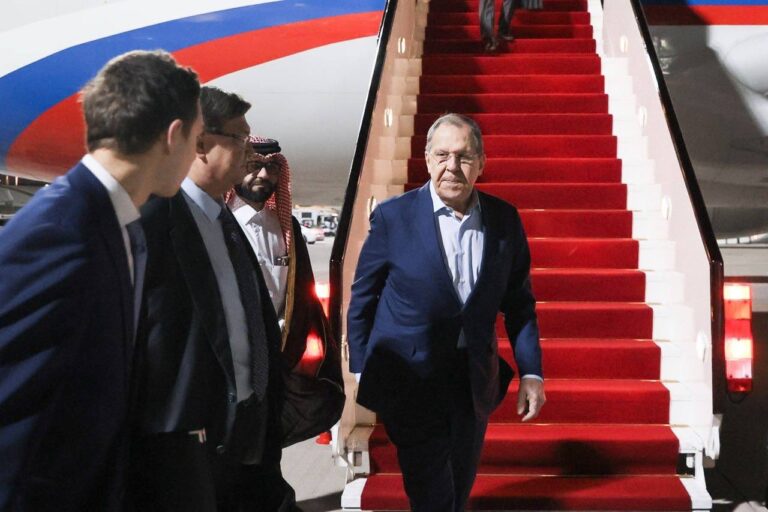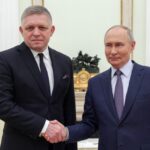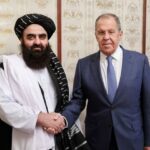The April 2025 visit of Sheikh Tamim bin Hamad Al Thani, Emir of Qatar, to Moscow marks a significant diplomatic engagement between two countries seeking to expand their influence in a rapidly polarizing world. While Russia remains isolated from the West due to its war in Ukraine, Qatar continues to act as a high-stakes geopolitical player, balancing ties with the U.S., Iran, and now, more openly, with Russia. T
I. Strategic Aims and Goals
1. Russian Objectives
a. Break Diplomatic Isolation
- As Western sanctions mount and traditional partnerships fray, Russia is keen to show that it is not globally isolated.
- A high-profile visit from the Emir of Qatar provides a prestige boost and symbolic legitimacy, especially within the Global South and the Arab world.
b. Energy Coordination
- Both countries are leading gas exporters (Qatar via LNG, Russia via pipeline and some LNG).
- They are co-members of the Gas Exporting Countries Forum (GECF).
- Russia is seeking closer coordination on gas pricing and export strategies, particularly in competition with the U.S. and EU LNG markets.
c. Investment and Economic Diversification
- Russia is increasingly turning to sovereign wealth funds from the Gulf to replace lost Western capital.
- Qatar’s QIA (Qatar Investment Authority) is viewed as a potential partner in critical sectors like infrastructure, real estate, and tech—especially as Russian domestic capital faces constraints.
d. Geopolitical Leverage in the Middle East
- Russia wants to preserve its role as a broker in conflicts such as Syria, Libya, and potentially Gaza.
- Qatar, with its influence over Hamas and Islamist movements, is key to Moscow’s multi-vector diplomacy in the region.
2. Qatari Objectives
a. Showcase Diplomatic Independence
- Qatar maintains open channels with both the U.S. and Russia, and this visit reinforces its image as a flexible, neutral, and indispensable broker.
- This neutrality increases Qatar’s strategic value, especially in multipolar negotiations.
b. Seek Coordination on Gaza and Middle East Stability
- With war still raging in Gaza and growing pressure on Hamas (with whom Qatar has ties), Doha may seek Russian help in stabilizing negotiations or avoiding wider conflict.
- Russia’s contacts with Iran, Hezbollah, and Assad make it a valuable interlocutor.
c. Explore Economic Openings
- Qatar may be looking at opportunities in Russian markets opened by the exodus of Western firms—particularly in energy tech, logistics, and infrastructure.
d. Manage Competition in the Gas Sector
- Qatar’s LNG expansion risks driving down global gas prices. Talks with Russia may aim to coordinate or de-conflict their strategies, much like Saudi-Russian cooperation in OPEC+.
II. Why Qatar Matters to Russia
- Energy Superpower Peer
- Qatar is one of the few countries whose gas production and export capacity rivals Russia’s.
- Coordination with Qatar could stabilize gas prices and provide leverage against Western LNG projects.
- Financial Muscle
- Qatar’s $500+ billion sovereign wealth fund offers potential financing for sanctioned Russian sectors.
- Qatar already owns stakes in Rosneft and other Russian assets—showing past willingness to invest despite geopolitical headwinds.
- Diplomatic Access Point
- Qatar is often the only dialogue channel with actors the West refuses to engage with (e.g., Taliban, Hamas, certain factions in Syria).
- Moscow sees Doha as a bridge to Islamist movements and Arab decision-makers.
- Symbol of Non-Western Support
- Russia aims to create a multipolar world order, with alliances outside the Western bloc.
- Strong ties with Qatar reinforce Moscow’s Global South outreach—both symbolically and materially.
- The visit underscores that Gulf states are not aligned with the West on isolating Russia, even if they remain partners with Washington.
- A more balanced, transactional Gulf foreign policy is taking shape.
2. Increased Complexity in Middle East Diplomacy
- Qatar and Russia could coordinate roles in Syria, Gaza, and Libya, potentially sidelining Western-led initiatives.
- This could also give Russia indirect leverage in negotiations with the U.S. and EU.
3. Risk of Western Backlash on Qatar
- While Qatar has long balanced conflicting alliances, an overt alignment with Moscow—especially in the energy sector—could raise suspicions in Washington and complicate its image as a U.S. strategic partner.
4. Energy Market Implications
- If Russia and Qatar coordinate on LNG exports and pipeline vs maritime strategies, the global gas market could become more cartelized.
- This may undermine Western goals of energy diversification, especially in Europe.
The Emir of Qatar’s visit to Moscow is more than a ceremonial gesture—it is a strategic pivot point. For Russia, it signals diplomatic relevance, energy cooperation, and financial hope. For Qatar, it cements its status as a global mediator and energy heavyweight, willing to engage all poles of power. As both states navigate a fractured international order, their ties could reshape power dynamics from Europe to the Persian Gulf and beyond.
Impact on Qatar–U.S. Relations
1. Strategic Balancing Act
Qatar has long followed a multi-alignment strategy, maintaining ties with the U.S., Iran, Turkey, and now Russia. This visit to Moscow is a continuation of that approach, but it pushes boundaries at a time when Washington is:
- Trying to isolate Russia diplomatically and economically,
- Concerned about Russia’s deepening ties with Iran and Hamas,
- And seeking to consolidate a regional coalition that can contain threats from Russia, China, and Iran.
Qatar’s outreach to Moscow could be seen in Washington as a signal of increasing autonomy, potentially eroding trustin the U.S.-Qatar relationship.
2. Gaza Diplomacy and Friction
- Qatar is already under U.S. and Israeli pressure over its ties to Hamas and its role in hosting Hamas leadership.
- Engaging with Russia—who is also talking to Hamas and Iran—might make Qatar appear too accommodating to U.S. adversaries.
- This could complicate trilateral talks (U.S.–Israel–Qatar) on hostage releases, ceasefires, and Gaza reconstruction.
However, the counterargument from Qatar is: “You need us precisely because we can talk to everyone.” That remains Doha’s diplomatic defense.
3. Economic and Defense Consequences
- If Qatar is seen as drifting too close to Russia, the U.S. Congress could slow defense or intelligence cooperation, or even delay arms deals or tech transfers.
- While that’s unlikely in the short term (Qatar is too strategically valuable), it could influence future trust levels and joint planning, especially within CENTCOM.
4. Reputation Management
Qatar is extremely image-conscious. Hosting the World Cup, funding Western universities, and investing in media (Al Jazeera) are all about soft power and global prestige.
- Too-close engagement with Russia could trigger reputational costs in Western public opinion, media, or financial circles.
- That may lead Qatar to publicly downplay the visit, or frame it as a peace and diplomacy effort, not a shift in alignment.
While the Emir’s visit to Moscow signals growing strategic ties with Russia, it also highlights the complexity of Qatar’s foreign policy. As a close U.S. military partner, the move could raise questions in Washington about Doha’s neutrality, especially given shared Russian-Qatari ties to Hamas and Iran. Yet for Qatar, this is business as usual: leveraging its unique access to all sides to remain an indispensable mediator. The real risk lies not in the meeting itself, but in how Qatar manages perception—and whether the U.S. sees this as pragmatism or provocation.
Russia absolutely sees Qatar as a potential indirect channel to Washington. But the influence is limited, subtle, and highly situational.
How Russia Might Use Qatar to Influence Washington
1. Backchannel for Crisis Messaging
- In past crises (like during the Taliban’s return or the Syria conflict), Qatar has served as a diplomatic backchannel.
- Russia could use its relationship with Qatar to float messages, proposals, or warnings to Washington—without direct engagement.
- Especially useful when official U.S.–Russia channels are frozen or toxic.
Qatar is a diplomatic “middleman” Moscow might exploit when direct lines are too risky or unavailable.
2. Gaza and Hamas Mediation
- Both Russia and Qatar have working relations with Hamas and access to Iran.
- If Moscow coordinates with Doha on ceasefire terms or humanitarian talks, it could position itself as a behind-the-scenes broker—adding pressure on the U.S. to negotiate indirectly.
- This gives Russia leverage in Middle East negotiations it otherwise might lack.
3. Energy Leverage Through Gas Coordination
- If Russia and Qatar align on LNG strategy or global gas pricing (e.g., limiting supply to raise prices), it could:
- Undermine Western efforts to diversify away from Russian energy.
- Raise costs for U.S. allies in Europe.
- Influence Washington’s economic calculations, especially in election seasons or during energy crises.
Limits of Russian Influence Through Qatar
Qatar Is Not Russia’s Proxy
- Qatar’s foreign policy is highly independent, and it will not act as a tool for Russian geopolitical objectives.
- Doha is still deeply tied to the U.S. militarily and economically, and any perception of being used by Russia could backfire hard.
U.S. Skepticism of Russian Moves
- Washington is unlikely to change core policies just because of a Russian-Qatari message.
- U.S. officials know the game and are wary of manipulation via third parties.
⛽ Competing Energy Interests
- While Russia and Qatar might cooperate tactically, they’re also competitors in global LNG markets. That limits long-term alignment.
Russia can try to use Qatar to influence Washington—but only indirectly, carefully, and on specific issues.
Qatar might carry messages or shape narratives that reflect Russian interests, but it will always act in its own interest first. Still, in a world of broken alliances and frozen diplomacy, even small influence through a trusted third party can matter.




